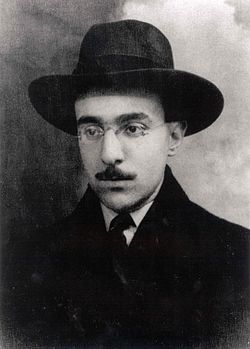Fernando Pessoa Quote
The Complete Work is essentially dramatic, thought it takes different forms - prose passages in this first volume, poems and philosophies in other volumes. It's the product of the temperament I've been blessed or cursed with - I'm not sure which. All I know is that the author of these lines (I'm not sure if also of these books) has never had just one personality, and has never thought or felt except dramatically - that is, through invented persons, or personalities, who are more capable than he of feeling what's to be felt.
Fernando Pessoa
The Complete Work is essentially dramatic, thought it takes different forms - prose passages in this first volume, poems and philosophies in other volumes. It's the product of the temperament I've been blessed or cursed with - I'm not sure which. All I know is that the author of these lines (I'm not sure if also of these books) has never had just one personality, and has never thought or felt except dramatically - that is, through invented persons, or personalities, who are more capable than he of feeling what's to be felt.
Tags:
heteronyms, identity
Related Quotes
About Fernando Pessoa
Fernando António Nogueira de Seabra Pessoa (; Portuguese: [fɨɾˈnɐ̃du pɨˈsoɐ]; 13 June 1888 – 30 November 1935) was a Portuguese poet, writer, literary critic, translator, and publisher. He has been described as one of the most significant literary figures of the 20th century and one of the greatest poets in the Portuguese language. He also wrote in and translated from English and French.
Pessoa was a prolific writer both in his own name and approximately seventy-five other names, of which three stand out: Alberto Caeiro, Álvaro de Campos, and Ricardo Reis. He did not define these as pseudonyms because he felt that this did not capture their true independent intellectual life and instead called them heteronyms, a term he invented. These imaginary figures sometimes held unpopular or extreme views.
Pessoa was a prolific writer both in his own name and approximately seventy-five other names, of which three stand out: Alberto Caeiro, Álvaro de Campos, and Ricardo Reis. He did not define these as pseudonyms because he felt that this did not capture their true independent intellectual life and instead called them heteronyms, a term he invented. These imaginary figures sometimes held unpopular or extreme views.
